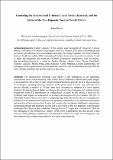Contesting the International Criminal Court : Bashir, Kenyatta, and the status of the non-impunity norm in world politics
Abstract
The International Criminal Court (ICC) is the centerpiece of an expanding international norm of nonimpunity, which holds that all individuals should be equally subject to accountability for atrocity crimes. Despite rapid institutional growth, the ICC faces a number of challenges, including enduring resistance to the prosecution of senior state officials. Over the past decade, a number of African states have attempted to suppress ICC cases against Sudanese President Omar al Bashir and Kenyan President Uhuru Kenyatta and enshrine formal exemptions from ICC jurisdiction for sitting Heads of State. In this article, I focus on the dynamics and impact of contestation in a highly institutionalized environment. The ICC is embedded within a dense network of overlapping legal rules and norms and, as a consequence, debates over its operation and legitimacy are primarily undertaken via the distinctive discourses and practices of international law. I argue that, despite often vociferous challenges, contestation surrounding Bashir and Kenyatta has not led to an erosion of the nonimpunity norm because challenges have been largely conducted through modes of “applicatory contestation” that are less damaging to the foundational validity of the norm. Legalization has thus played a dual role, providing strategic justifications for attempts to narrow the scope of nonimpunity, but also empowering counter-contestation by pro-norm constituencies.
Citation
Bower , A S 2019 , ' Contesting the International Criminal Court : Bashir, Kenyatta, and the status of the non-impunity norm in world politics ' , Journal of Global Security Studies , vol. 4 , no. 1 , pp. 88-104 . https://doi.org/10.1093/jogss/ogy037
Publication
Journal of Global Security Studies
Status
Peer reviewed
Type
Journal article
Collections
Items in the St Andrews Research Repository are protected by copyright, with all rights reserved, unless otherwise indicated.

